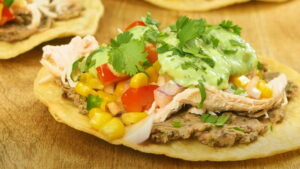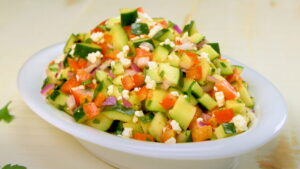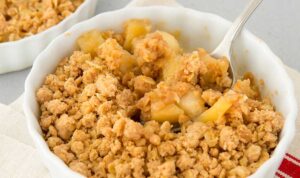
Para leer en Español, por favor haga clic aquí
Eating heart-healthy is a year-round, mindful lifestyle choice. However, summer days come with many temptations. Go ahead and indulge in fun foods like ice cream, french fries, and funnel cake every once in a while, but make sure to take advantage of the Garden State’s bounty of heart-healthy fruits and vegetables.
According to Brett Waldman, MD, a Cooper cardiologist and member provider of Cooper and Inspira Cardiac Care, heart-healthy eating includes:
- Getting enough (or more than enough) fiber by eating plenty of fruits, vegetables, beans, and whole grains
- Limiting foods high in saturated and trans fats, such as pizza, burgers, and creamy sauces
- Cutting down on salt (sodium)
Fruits and Vegetables
Dr. Waldman suggests filling half of your plate with fruits and vegetables at each meal.
Did you know that New Jersey is one of the top 10 producers in the U.S. of blueberries, cranberries, tomatoes, bell peppers, eggplant, spinach, squash, and asparagus? This means you can find locally grown produce just about everywhere. Another great idea is to visit a local farm or farmer’s market to see what’s in season. You can find the closest one here: https://findjerseyfresh.com/explore/
Dairy
Recent studies show the beneficial relationship between dairy foods and blood pressure because of the nutrients found in dairy foods. People who regularly enjoy milk, cheese, and yogurt have a lower risk of both heart disease and stroke. Aim for the recommended three servings of dairy foods daily. Try to choose fat-free or low-fat options when possible, although a new Harvard study shows that full-fat versions are effective as well.
Whole Grains
Always read labels. When choosing breads and cereals, make sure that whole wheat or another whole grain is listed first in the ingredient list, or look for products that say 100% whole grain. Remember, three servings of whole grains per day can help your heart to stay healthy.
Protein
The American Heart Association reports that many Americans get more protein than needed from meats high in saturated fat. Choosing foods that are low in saturated and trans fats can help lower your blood cholesterol and decrease your risk of coronary artery disease.
“Consuming too much saturated fat can lead to a buildup of plaque in your arteries, which can increase your risk of heart attack and stroke,” Dr. Waldman says.
It’s important to replace high-fat meats with healthy proteins, including:
- Seafood—salmon, mackerel, herring, and albacore tuna
- Poultry—skinless chicken or turkey breast or lean ground chicken or turkey (at least 93 percent lean)
- Lean meats—pork shoulder, beef sirloin, or lean ground beef (at least 93 percent lean)
- Legumes—black beans and garbanzo beans (chickpeas)
- Eggs
- Unsalted nuts, seeds, and nut butters, like almond or peanut butter
- Tofu
Healthy Fats and Oils
Replacing saturated fat with healthier unsaturated fats, such as nuts, seeds, and avocados, can contribute to a heart-healthy diet. Not sure where to start? Try these healthy swaps:
- Vegetable oil (canola, corn, olive, peanut, safflower, soybean, or sunflower) instead of butter for cooking
- Salad dressings made with olive oil or flaxseed oil
- Oil-based salad dressings, such as balsamic vinaigrette and Italian, instead of creamy dressings like ranch
- Low-fat or light mayonnaise instead of full-fat versions
Make It Tasty
If you think heart-healthy options sound bland and boring, think again! You can try different methods of cooking, such as baking, broiling, grilling, steaming, or poaching, to add variety and flavor. Here are a few recipes from the American Heart Association that will make your meals tasty AND healthy.
Chicken and Black Bean Tostadas With Avocado Cream
https://recipes.heart.org/en/recipes/chicken-and-black-bean-tostada-with-avocado-cream
Simple Persian Salad
https://recipes.heart.org/en/recipes/simple-persian-salad
Apple Pear Crisp
https://recipes.heart.org/en/recipes/apple-pear-crisp
“By all means, enjoy the summer, and indulge in your favorite summer treats.” Dr. Waldman says. “but keep these heart-healthy tips in mind to ensure that you have many more summers to look forward to!”
To make an appointment with one of our cardiovascular experts, call 833.SJHEART (833.754.3278) or use our online appointment form.
Consejos para una alimentación veraniega saludable para el corazón
Comer sano para el corazón es una opción de estilo de vida consciente durante todo el año. Sin embargo, los días de verano vienen con muchas tentaciones. Continúe y disfrute de comidas divertidas como helado, papas fritas y pastel de embudo de vez en cuando, pero asegúrese de aprovechar la abundancia de frutas y verduras saludables para el corazón de Garden State.
Según Brett Waldman, MD, cardiólogo de Cooper y proveedor miembro de Cooper and Inspira Cardiac Care, una alimentación saludable para el corazón incluye:
- Obtener suficiente (o más que suficiente) fibra al comer muchas frutas, verduras, frijoles y granos integrales
- Limitar los alimentos con alto contenido de grasas saturadas y trans, como pizza, hamburguesas y salsas cremosas
- Reducir el consumo de sal (sodio)
Frutas y vegetales
El Dr. Waldman sugiere llenar la mitad de su plato con frutas y verduras en cada comida.
¿Sabía que Nueva Jersey es uno de los 10 principales productores de arándanos, arándanos, tomates, pimientos, berenjenas, espinacas, calabazas y espárragos en los EE. UU.? Esto significa que puede encontrar productos cultivados localmente en casi todas partes. Otra gran idea es visitar una granja local o un mercado de agricultores para ver qué hay de temporada. Puedes encontrar el más cercano aquí: https://findjerseyfresh.com/explore/
Lácteos
Estudios recientes muestran la relación beneficiosa entre los productos lácteos y la presión arterial debido a los nutrientes que se encuentran en los productos lácteos. Las personas que regularmente disfrutan de la leche, el queso y el yogur tienen un menor riesgo de enfermedad cardíaca y accidente cerebrovascular. Apunta a las tres porciones recomendadas de productos lácteos al día. Trate de elegir opciones sin grasa o bajas en grasa cuando sea posible, aunque un nuevo estudio de Harvard muestra que las versiones enteras también son efectivas.
Granos Integrales
Siempre lea las etiquetas. Al elegir panes y cereales, asegúrese de que el trigo integral u otro grano integral figure primero en la lista de ingredientes, o busque productos que digan 100 % granos integrales. Recuerde, tres porciones de granos integrales por día pueden ayudar a que su corazón se mantenga saludable.
Proteína
La American Heart Association informa que muchos estadounidenses obtienen más proteínas de las necesarias de las carnes con alto contenido de grasas saturadas. Elegir alimentos bajos en grasas saturadas y trans puede ayudar a reducir el colesterol en la sangre y disminuir el riesgo de enfermedad de las arterias coronarias.
“Consumir demasiadas grasas saturadas puede provocar la acumulación de placa en las arterias, lo que puede aumentar el riesgo de ataque cardíaco y accidente cerebrovascular”, dice el Dr. Waldman.
Es importante reemplazar las carnes ricas en grasas con proteínas saludables, que incluyen:
- Mariscos: salmón, caballa, arenque y atún blanco
- Aves: pechuga de pollo o pavo sin piel o pollo o pavo magro molido (al menos 93 por ciento magro)
- Carnes magras: paleta de cerdo, solomillo de res o carne molida magra (al menos 93 por ciento magra)
- Legumbres: frijoles negros y garbanzos (garbanzos)
- Huevos
- Nueces sin sal, semillas y mantequillas de nueces, como almendras o mantequilla de maní
- tofu
Grasas y aceites saludables
Reemplazar las grasas saturadas con grasas insaturadas más saludables, como nueces, semillas y aguacates, puede contribuir a una dieta saludable para el corazón. ¿No estás seguro por dónde empezar? Pruebe estos intercambios saludables:
Aceite vegetal (canola, maíz, oliva, maní, cártamo, soja o girasol) en lugar de mantequilla para cocinar
Aderezos para ensaladas hechos con aceite de oliva o aceite de linaza
Aderezos para ensaladas a base de aceite, como vinagreta balsámica e italiana, en lugar de aderezos cremosos como ranch
Mayonesa baja en grasa o ligera en lugar de versiones con toda la grasa
Hazlo Sabroso
Si cree que las opciones saludables para el corazón suenan insípidas y aburridas, ¡piénselo de nuevo! Puede probar diferentes métodos de cocción, como hornear, asar, asar a la parrilla, al vapor o escalfar, para agregar variedad y sabor. Aquí hay algunas recetas de la American Heart Association que harán que sus comidas sean sabrosas Y saludables.
Tostadas De Pollo Y Frijoles Negros Con Crema De Aguacate
https://recipes.heart.org/es/recetas/tostada-de-pollo-y-frijoles-negros-con-crema-de-aguacate
Ensalada Persa Sencilla
https://recipes.heart.org/es/recipes/ensalada-persa-simple
Crujiente de manzana y pera
https://recipes.heart.org/en/recipes/apple-pear-crisp
“Por todos los medios, disfruta del verano y disfruta de tus delicias veraniegas favoritas”. dice el Dr. Waldman. “¡Pero ten en cuenta estos consejos saludables para el corazón para asegurarte de tener muchos más veranos que esperar!”
Para programar una cita con uno de nuestros expertos cardiovasculares, llame al 833.SJHEART (833.754.3278) o utilice nuestro formulario de citas en línea.



